March 17, 2014 -- Updated 1037 GMT (1837 HKT)
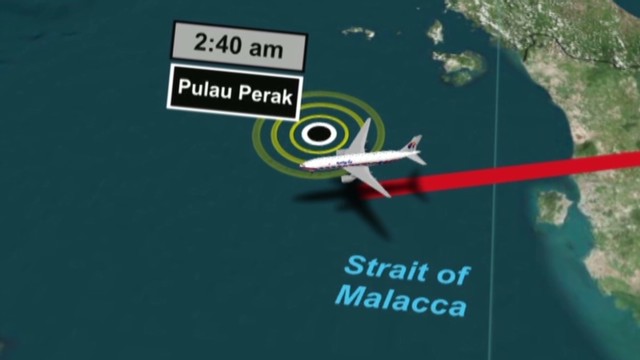
As investigators search for clues to
unravel the mystery of where Malaysia Airlines Flight 370 went, there
were several key developments over the weekend.
But major questions still remain.
Here's a cheat sheet to help you get up to speed on the latest developments:
Where are investigators searching now?

Report: Plane flew as low as 5,000 feet

Private ships search for missing flight

Waiting is the hardest part for families
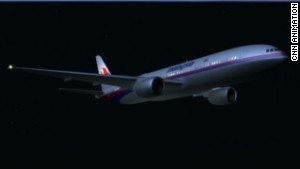
Flight 370: Facts vs. speculation

A look at history's biggest mysteries
The search has expanded to cover large swaths of land and sea,
including 11 countries and deep oceans. Where the plane went is
anybody's guess. As 25 nations help try to find where the missing plane
is, there's also a process of elimination in which investigators try to
piece together where the aircraft isn't. Pakistan said Sunday that the
plane never showed up on its civilian radars and would have been treated
as a threat if it had. The Times of India reported that India's
military also said there was no way the plane could have flown over
India without being picked up on radar.
What's one main focus of the investigation?
Malaysia's Prime Minister has said that somebody deliberately steered the plane off course. That means the pilots have become one obvious focus for investigators.
On Sunday, Malaysian police said they were still investigating a flight
simulator seized from pilot Zaharie Ahmad Shah's home. Peter Chong, a
friend of the 53-year-old pilot, said it's unfair to imply Zaharie had
anything to do with what happened to the plane. He told CNN he'd been to
Zaharie's house and tried out the flight simulator. "It's a reflection
of his love for people," Chong said, "because he wants to share the joy
of flying with his friends."
A 29-year-old Malaysian
civil aviation engineer, Mohammed Khairul Amri Selamat, who works for a
private jet charter company was on the flight. Police are investigating
all passengers and crew, but he is likely to be of particular interest
because of his aviation knowledge. "I am confident that he is not
involved," his father told CNN. "They're welcome to investigate me and
my family."
What do we know about key moments on the flight?
For days we've been
talking about the last transponder signal the plane sent. And now it
appears another system that sends data about the plane, the Aircraft Communications Addressing and Reporting System (ACARS) was shut off, too.
Authorities say that system was disabled early on in the flight, just
before the plane flew over the east coast of the Malay Peninsula. Before
the transponder was deactivated, the co-pilot is believed to have made
the plane's last verbal communication with air traffic controllers. "All
right, good night." (1:19 a.m.). At 2:40 a.m., military radar spotted
the plane hundreds of miles off course. And at 8:11 a.m. -- more than
seven hours after takeoff -- a satellite tracked the plane as it
attempted a series of "handshakes" -- or electronic connections -- with
it.
While some details have come into focus, major questions remain unanswered:
Where's the plane?
Satellite and radar data
have given authorities some clues, but not enough to pinpoint the
plane. Right now investigators are focusing on two corridors where the
plane might have either crashed or landed: a northern arc that stretches
from the border of Kazakhstan and Turkmenistan in central Asia to
northern Thailand, and a southern arc that spans from Indonesia to the
southern Indian Ocean. Because the northern parts of the traffic
corridor include some tightly guarded airspace over India, Pakistan and
even some U.S. installations in Afghanistan, U.S. authorities believe
it's more likely the aircraft crashed into waters outside of the reach
of radar south of India, a U.S. official told CNN. If it had flown
farther north, it's likely it would have been detected by radar.
Who would deliberately divert it?
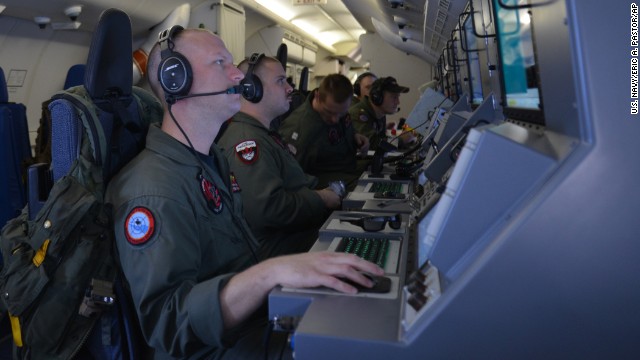 Photos: The search for Malaysia Airlines Flight 370
Photos: The search for Malaysia Airlines Flight 370
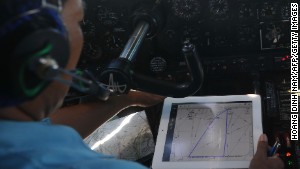
Jet disappearance 'unprecedented'
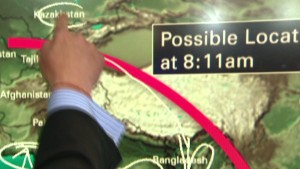
The search for Flight 370 continues
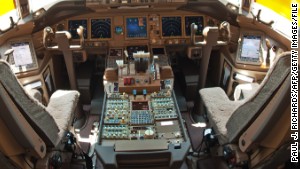
Will mystery of Flight 370 be solved?
In addition to the
pilots, other passengers and crew members onboard the plane, as well as
any ground staff who came into contact with it, are under investigation.
The bottom line, investigators say, is that whoever flew the plane off
course for hours appeared to know what they were doing. Investigators
are looking into the backgrounds of the passengers to see whether any of
them were trained pilots. "There are still a few countries who have yet
to respond to our request for a background check," said Khalid Abu
Bakar, inspector general of the Royal Malaysian Police Force. "But there
are a few ... foreign intelligence agencies who have cleared all
the(ir) passengers." According to The New York Times, one of the
passengers was an aviation engineer on his way to Beijing to work for a
private-jet company.
Why would they do it, and how?
Finding a motive behind
the plane's disappearance is a key problem investigators must solve. So
far, they haven't released any concrete details. Speculation has surged about the possibility of terrorism or hijacking, but that hasn't been confirmed.
Is there any chance the passengers and crew survived?
It's possible the
plane's last satellite contact could have been made from the ground, as
long as the airplane still had electrical power, Malaysia's civil
aviation chief Azharuddin Abdul Rahman said Sunday. For the families and
loved ones of those aboard Flight 370, some find comfort that there's
no evidence the plane crashed. The father of one passenger, who watched
updates from Malaysia in a Beijing hotel, said he hoped the plane was
hijacked because that gave him reason to think his son had survived. "I
hope they are alive," he said, "no matter how small the chance is."
Does the possibility that the plane is on land change anything about the investigation?
Yes, analysts told CNN.
It means it's even more pressing that authorities find the plane. "Time
is even more of the essence. If this airplane has been taken to be used
as a weapon, then the time that has been taken to prepare the aircraft
for whatever deed is the plan -- obviously to thwart that, it's all
about time," said Shawn Pruchnicki, who teaches aviation safety and
accident investigation at Ohio State University. CNN aviation analyst
Jim Tilmon, a former American Airlines pilot, said whoever deliberately
steered the plane off course likely did it with help. But what's next is
anyone's guess, he said. "We have been behind them all along," he said.
"So now, if they had a plan, and if that plan included being able to
set down someplace and refuel a little bit, we are looking at something
that we may never see the end of."
No comments:
Post a Comment